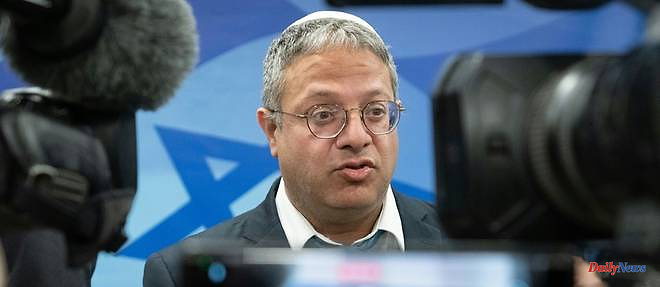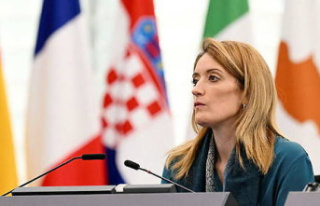Israeli Minister of National Security and far-right figure Itamar Ben Gvir, often accused of stoking tensions between Jews and Arabs, is now targeting Palestinian prisoners, touching one of the most sensitive points of the conflict.
Since entering the government formed by Benjamin Netanyahu, the most right-wing in the history of Israel, in December, Mr. Ben Gvir has promised to work to ensure that Palestinian prisoners are not treated with too much consideration.
After a January visit to the Nafha prison in the Negev desert, he told the media that he wanted to ensure "that the murderers of Jews do not enjoy better conditions" after the construction of new cells.
The minister, who belongs to the religious Zionist current, also said he wanted to make sure that the Palestinian detainees, whom he describes as "terrorists", are no longer served "fresh pita (bread) every morning, like s 'they were at the restaurant'.
"Not under my responsibility," he promised, ordering the closure of what he called "bakeries" open according to him in two Israeli prisons.
He was speaking after an attack by a Palestinian, which killed seven people near a synagogue in East Jerusalem, occupied and annexed by Israel, on January 27.
The Israeli prison services refused to confirm the existence of these bakeries. But the incendiary remarks of Mr. Ben Gvir provoked strong reactions.
In the Gaza Strip, controlled by the Palestinian Islamist movement Hamas, demonstrators held up placards bearing the words: "Ben Gvir, go to hell".
In a memorandum addressed to foreign diplomats in Jerusalem, seen by AFP, Hamas warned that any attempt to undermine the rights of prisoners would amount to "crossing all red lines", calling the subject a "detonator".
"In every family in the West Bank there is at least one person who has been arrested or brought before military justice," Milena Ansari, of the Palestinian prisoners' defense NGO Addameer, told AFP.
"It is therefore a subject that deeply touches the heart of the Palestinian identity," she notes.
According to Addameer, around 800,000 Palestinians have passed through Israeli prisons since the June 1967 Arab-Israeli war and the start of the occupation of Palestinian territories.
Mr. Ben Gvir, who heads the Jewish Force party, has been charged numerous times, including for incitement to racism.
The minister advocates the annexation by Israel of the West Bank and the transfer to neighboring countries of part of the Israeli Arabs, descendants of the Palestinians who remained on their land after the creation of Israel in 1948.
He also called for Palestinians prosecuted for terrorism to be subject to the death penalty, a subject which does not fall within the scope of his ministerial competences.
According to the Palestinian Prisoners Club, detainees will observe a hunger strike from Ramadan, at the end of March, to protest against the measures wanted by Mr. Ben Gvir.
In a Hebrew letter sent to the Kan public broadcaster and broadcast on Monday, prisoners' representatives threatened to "shed blood" if their conditions of detention were changed.
"We have nothing to lose (...) our destiny is to be fighters and our hope is to be martyrs," they say. "They won't be able to break us."
About 4,700 Palestinians are currently being held in Israeli jails, 190 of whom are under the age of 18, according to Addameer.
According to Basil Farraj, a researcher specializing in the issue of Palestinian detainees, prison is a factor in bringing together members of Hamas and those of Fatah, the movement of Palestinian President Mahmoud Abbas.
"Prisoners' resistance against Israeli practices" encourages unity and Mr. Ben Gvir "wants to break this feeling of a political organization", he explains.
The son of Palestinian leader Marwan Barghouthi, sentenced several times to life in prison, told AFP that he had not been allowed to contact his father for three months.
"Anything they do to him will only increase Palestinian support for him," warned Qassam Barghouthi.
02/15/2023 11:48:40 - Ramallah (Palestinian Territories) (AFP) - © 2023 AFP












